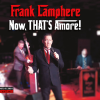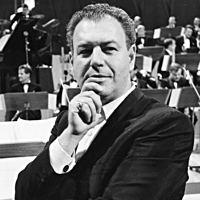Home » Jazz Musicians » Nelson Riddle
Nelson Riddle
Nelson Riddle - arranger (1921 - 1985)
Nelson Riddle was one of the greatest arrangers in the history of American popular music. He worked with many of the major pop vocalists of his day, but it was his immortal work with Frank Sinatra, particularly on the singer’s justly revered Capitol concept albums, that cemented his enduring legacy. He was a master of mood and subtlety, and an expert at drawing out a song’s emotional subtext. He was highly versatile in terms of style, mood and tempo, and packed his charts full of rhythmic and melodic variations and rich tonal colors that blended seamlessly behind the lead vocal line. He often wrote specifically for individual vocalists, keeping their strengths and limitations in mind and pushing them to deliver emotionally resonant performances. This is evidenced certainly in his work with Sinatra in the following quote from Charles Granata’s book “Sessions with Sinatra,”: “It quickly became apparent that Riddle, of all the arrangers the singer had worked with, complemented Sinatra’s talents better than anyone else.”
Born June 1, 1921 in Oradell, NJ, Nelson Smock Riddle studied piano as a child, later switching to trombone at the age of 14. After getting out of the service, he spent 1944-1945 as a trombonist with the Tommy Dorsey Orchestra, also writing a couple of arrangements (“Laura”, “I Should Care”). By the end of 1946, with the help of good friend, Bob Bain, he secured a job arranging for Bob Crosby in Los Angeles. He then became a staff arranger at NBC Radio in 1947, and continued to study arranging and conducting with Mario Castelnuovo-Tedesco and Victor Young.
Soon he was occasionally writing for Nat King Cole, initially as a ghost-arranger. However, the successes of his arrangements for “Mona Lisa” (1950) and “Too Young” (1951) set him on his way to doing most of Nat’s music at Capitol Records. By this time, Nelson Riddle had become conductor of the orchestra and had his name printed on the record label. He was no longer an anonymous arranger.
When Frank Sinatra signed with Capitol Records in 1953, the label encouraged him to work with the up-and-coming Riddle, who was now Capitol’s in-house arranger. Though he had helped Nat achieve his biggest hit, “Mona Lisa”, Sinatra was still reluctant. He soon recognized the freshness of Riddle’s approach, however, and eventually came to regard him as his most sympathetic collaborator. The first song they cut together was “I’ve Got the World on a String.” When Sinatra and Riddle began to record conceptually unified albums that created consistent moods, the results were some of the finest and most celebrated albums in the history of popular music. There was a great mutual respect between them. As Riddle comments in his 1985 KCRW interview, “He opened some doors which without his intervention would have remained closed to me.”
Read moreTags
Backgrounder: Nelson Riddle - Changing Colors

Source:
JazzWax by Marc Myers
Yesterday, I posted on Nelson Riddle's little-known Communication album in 1971 for MPS Records. Two years later, Riddle recorded a second album for MPS that was equally excellent—Changing Colors. The song list on this album was a fresh mixed bag, including three originals, a George Harrison song and standards: My Life (composed by Claus Ogerman) My Sweet Lord (George Harrison) Sao Paulo (Nelson Riddle) (They Long to Be) Close to You (David, Bacharach) My One and Only Love (Wood, Mellin) ...
read more
Backgrouder: Nelson Riddle - Communication

Source:
JazzWax by Marc Myers
In 1971, Hans Georg Brunner-Schwer, the founder of Germany's MPS Records, had an idea. But first he had two questions: Why would an arranger the likes of Nelson Riddle be reduced to composing, arranging and conducting for The 101 Strings, an album released a year earlier? And why would he be compelled to record originals straining to be with-it? Listening to the tracks, Brunner-Schwer realized immediately that the project was a huge mismatch. The reason for Riddle's participation was simple: ...
read more
Early Nelson Riddle

Source:
JazzWax by Marc Myers
Arranger Nelson Riddle is most often associated with Frank Sinatra. Which makes sense, since Riddle scored a number of successful albums for Sinatra in the 1950s that sassed up the singer's swinging sound at Capitol. He did this with playful sectional riffs, unusual instrumental textures and bright solo tones added for punctuation. But where did Riddle's sound for Sinatra begin? Yesterday I took a look at Riddle's pre-Sinatra jazz discography for clues. Here's Riddle's first known recorded arrangement for Charlie ...
read more
Nelson Riddle: 'Changing Colors'

Source:
JazzWax by Marc Myers
Nelson Riddle slowed down a bit in the 1970s. After spending the two previous decades arranging dozens of albums credited to him and probably dozens more for lucrative ghost projects, Riddle worked on just one or two albums a year in the '70s before his comeback with Linda Ronstadt's three hit Songbook albums starting in 1983. For Riddle, there were a couple of 101 Strings dates in 1970, an Ella Fitzgerald session (Dream Dancing) in 1972 and a Michel Legrand ...
read more
Nelson Riddle + Phil Silvers

Source:
JazzWax by Marc Myers
Jazz historian Dan Morgenstern told me about this LP when I interviewed him for my Wall Street Journal piece on the history of Taps last week. We were talking about the influence of Taps and bugle calls on jazz and popular song. “I seem to recall a Phil Silvers album, where he's in his Sgt. Bilko outfit on the cover and bugle calls were used as the basis for songs," Dan said. A little research later and voila! Phil Silvers ...
read more
Oscar Peterson and Nelson Riddle

Source:
JazzWax by Marc Myers
Easy Listening as a genre has been unfairly maligned for years. Since the advent of rock in the late 1960s, the entire category has been disparaged as “elevator," “background" or “mall" music, depending on the decade. The assault has been so pronounced that the very term “Easy Listening" now is code for “artless music." But like all types of music, there's good Easy Listening and bad. The newly released Oscar Peterson & Nelson Riddle recorded for Verve in November 1963 ...
read more
































